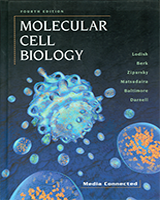From: Section 24.1, Tumor Cells and the Onset of Cancer

NCBI Bookshelf. A service of the National Library of Medicine, National Institutes of Health.
背景知识
[Wikipedia] 癌症(cancer)是医学术语,其为最常见的恶性肿瘤,亦有人将癌症和恶性肿瘤混合使用;为由控制细胞分裂增殖机制失常而引起的疾病。癌细胞除了分裂失控外,还会局部侵入周遭正常组织甚至经由体内循环系统或淋巴系统转移到身体其他部分。
癌细胞持续生长而不受外在讯息调控,可能是原本正常的原癌基因被激活,将细胞引入到癌变状态,但主要还是因为一些与控制细胞分裂有关的蛋白质出现异常,如肿瘤抑制基因的功能失常。导致这种局面,可能是为该蛋白编码的DNA因突变而出现了损伤,转译而出的蛋白质因此也出现错误。要将一个正常细胞转化成一个恶性肿瘤细胞通常需要许多次突变发生,或是基因转译为蛋白质的过程受到干扰[2]。
引起基因突变的物质被称为致癌物质,又以其造成基因损伤的方式可分为化学性致癌物与物理性致癌物。例如接触放射性物质,或是一些环境因子,例如,香烟、辐射、酒精。还有一些病毒可将本身的基因插入细胞的基因里,激活癌基因。但突变也会自然产生,所以即使避免接触上述的致癌因子,仍然无法完全预防癌症的产生。发生在生殖细胞的突变有可能传至下一代。
各个年龄层的人都有可能产生癌症,由于DNA的损伤会随着年龄而累积增加,年纪越大得到癌症的机会也随之增加。随着人均寿命的增加,癌症在发达国家中已成为主要死亡原因之一。
看图说话: 肠癌的发展阶段与对应的基因突变
(1)APC 肿瘤抑制基因突变(5号染色体):息肉(polyp)
(2)K-ras 原癌基因突变(12号染色体):II级良性肿瘤(adenoma)
(3)DCC 肿瘤抑制基因突变(18号染色体):III级良性肿瘤(adenoma)
(4)p53 肿瘤抑制基因突变(17号染色体):恶性肿瘤(癌症)(carcinoma)
(5)其他变化:癌细胞浸润(invasion)与扩散(metastasis)
所有四个基因都发生特定的突变,就会导致肠癌。突变需要时间,所以年龄大的人容易得癌症。某些环境因素可以加速突变过程。坊间常常讹传的“人人身上都有癌细胞”,是错误的。

A mutation in the APC tumor-suppressor gene in a single epithelial cell causes the cell to divide, although surrounding cells do not, forming a mass of localized benign tumor cells called a polyp. Subsequent mutations leading to expression of a constitutively active Ras protein and loss of two tumor-suppressor genes, DCC and p53, generates a malignant cell carrying all four mutations; this cell continues to divide and the progeny invade the basal lamina that surrounds the tissue. Some tumor cells spread into blood vessels that will distribute them to other sites in the body. Additional mutations cause exit of the tumor cells from the blood vessels and growth at distant sites; a patient with such a tumor is said to have cancer. [Adapted from B. Vogelstein and K. Kinzler, 1993, Trends Genet. 9:101.]
From: Section 24.1, Tumor Cells and the Onset of Cancer

NCBI Bookshelf. A service of the National Library of Medicine, National Institutes of Health.